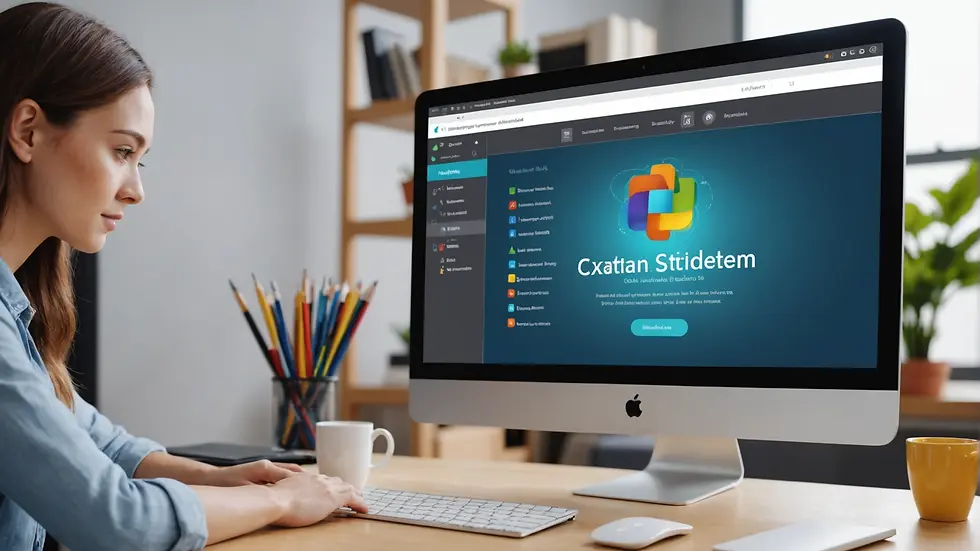E-Learning in Special Education and Early Intervention Training
- Dr. Tontaleya Moore
- Nov 1, 2024
- 4 min read
In today’s fast-changing world, education is evolving, particularly in special education and early intervention training. E-learning has revolutionized traditional teaching methods, providing flexible and creative ways to support children with diverse needs. This powerful tool doesn’t just change how educators learn; it reshapes opportunities for students, equipping them with the resources and knowledge they need to succeed.
Understanding Special Education and Early Intervention
Special education involves personalized educational programs designed for students with disabilities. These services can include tailored instruction, specialized learning materials, and support from trained educators. For instance, a child with autism might benefit from a customized learning plan that emphasizes social skills training alongside academic subjects.
Early intervention focuses on giving support to infants and toddlers at risk for developmental delays. According to the Centers for Disease Control and Prevention (CDC), early intervention can reduce the need for special education later on by up to 30%. By identifying issues and implementing strategies early, caregivers can significantly enhance a child's potential for future learning.
Both special education and early intervention require specialists who are well-trained. E-learning platforms have democratized this training, making it available to anyone, anywhere.
The Rise of E-Learning in Special Education
E-learning provides numerous benefits for those involved in special education and early intervention. A major advantage is the flexibility it offers. Educators can access training at their convenience, making it easier for those working full-time or with family obligations to participate. For example, a teacher might complete a course on adaptive technology late at night or during weekends, fitting it around their busy schedule.
E-learning also boasts a wealth of resources, including video lectures, interactive activities, and forums for discussion. These diverse materials cater to a variety of learning styles. A visual learner might thrive in a course featuring animated videos, while an auditory learner could benefit from podcasts and audio lectures.

Enhancing Skill Development through E-Learning
E-learning equips educators with essential skills for effectively engaging students in special education and early intervention. For instance, a course on behavior management strategies might include real-life case studies and scenarios that teachers could encounter in the classroom. This practical approach helps solidify understanding and boosts confidence in applying these strategies.
Furthermore, interactive features like quizzes and simulations ensure educators actively apply their learning. For example, online role-playing exercises can simulate challenging classroom situations, allowing educators to practice their responses without the pressure of a real-life environment.
Peer interactions through online discussion boards are also vital. Engaging with fellow educators allows participants to share experiences and insights, enriching their learning experience.
Bridging Resources and Collaboration
E-learning serves as a bridge connecting educators, specialists, and families in the realm of special education. Many online courses provide discussions focused on best practices and the latest research, promoting collaboration across different professions. For example, a course might include contributions from speech therapists, helping educators better understand communication strategies for their students.
Moreover, many e-learning platforms offer resources specifically for parents. When families have access to strategies that align with what their children are learning in school, it results in a more supportive environment. This consistent approach can make a tangible difference in students’ success rates.
Customizable Learning Experiences
A key benefit of e-learning is its ability to customize training to fit individual needs. In special education, where every child has unique requirements, this flexibility is crucial. Educators can tailor their learning experience by selecting courses that address their specific challenges, like integrating assistive technology into their curricula.
This personalized approach fosters deeper engagement with the material. Instead of following a preset path, educators can prioritize areas that will have the greatest impact on their teaching practice.

Overcoming Challenges in Special Education Training
While e-learning has significant advantages, it also presents challenges. For many, the self-discipline required for online learning can be daunting. This lack of face-to-face interaction might lead to feelings of isolation.
To counter this, several platforms introduce community-building features such as mentorship programs and study groups. Participating in a virtual learning community can motivate individuals to stay on track with their studies.
Technical issues can also present barriers. However, many e-learning providers are dedicated to improving user experience and often include support systems to help users navigate these challenges.
Future Directions of E-Learning in Special Education
The future of e-learning in special education appears bright. As technology progresses, new tools will constantly transform the learning landscape. For example, virtual reality simulations can create immersive training environments, helping educators to practice skills in realistic scenarios.
Additionally, the use of data analytics in e-learning can lead to even more personalized experiences. By analyzing progress, educators can receive tailored feedback, allowing them to make informed decisions about their professional development and classroom strategies.
In summary, e-learning is a game-changer in special education and early intervention training. Its accessibility and flexibility empower educators to develop skills that directly impact the success of students with diverse needs. As this field continues to evolve, the opportunities for innovation and collaboration will also grow, benefiting everyone involved.
A New Era of Learning
The impact of e-learning in special education and early intervention training is profound. Educators who embrace these modern tools not only enhance their knowledge but also elevate the educational outcomes for children. By leveraging e-learning, we are building a more inclusive future for all learners, ensuring that every child has the chance to thrive.
The journey toward unlocking the potential for children with disabilities starts with well-equipped educators, supported by the right tools and training. E-learning stands at the forefront of this vital mission, paving the way for a fairer and more effective education system.




Comments